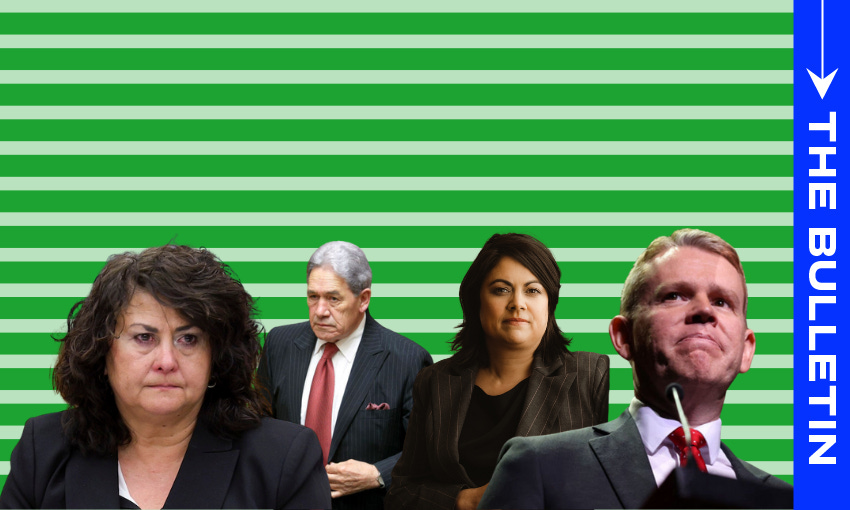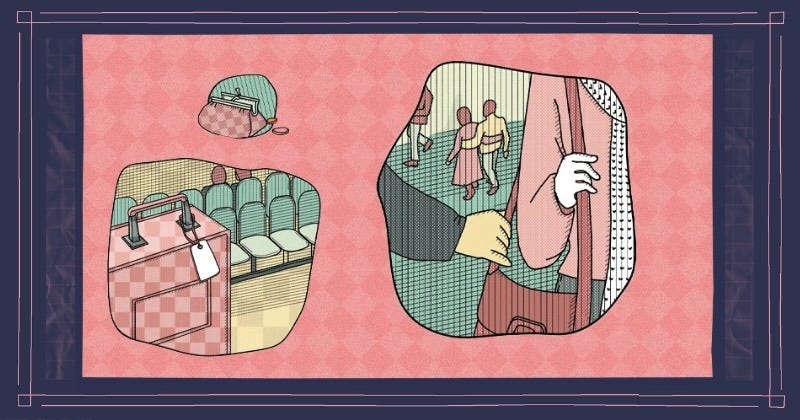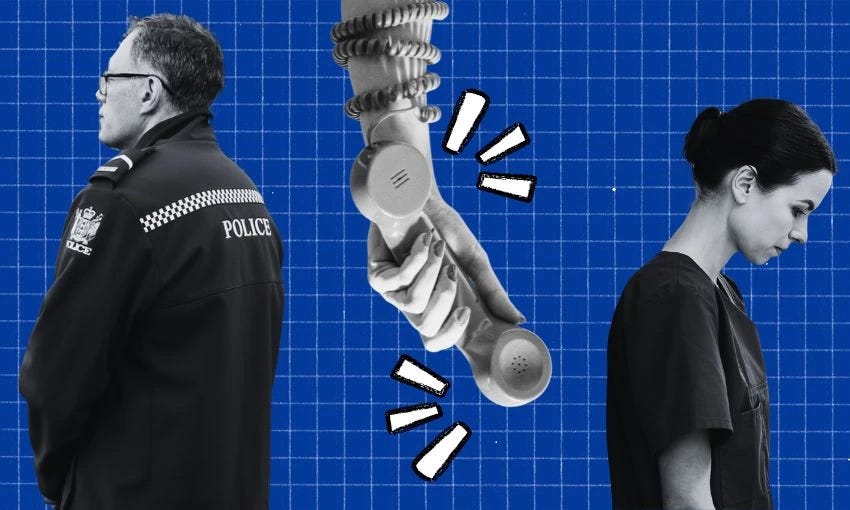Conflicts over conflicts: Why perception in politics matters
Tensions over tobacco regulations hit boiling point in parliament yesterday.
Mōrena, and welcome to The Bulletin for Wednesday, November 6.
In today’s edition: It’s decision day in the United States and new modelling suggests the race will be closer than ever, the controversial Treaty Principles Bill will be introduced to parliament this week, and Wellington will get two new tunnels in a bid to ease congestion. But first, conflicts over conflicts of interest dominated question time yesterday.
Alleged conflicts on both sides
The battle over tobacco products heated up once again yesterday, with Labour and the unions taking aim at the government for publicly criticising public servants they say are just doing their jobs. It all started last month: Winston Peters, with the protection of parliamentary privilege, revealed that a sister in law of Labour’s health spokesperson Ayesha Verrall was a Ministry of Health official that had worked alongside the associate health minister, Casey Costello. Peters said the official should have disclosed her relationship to Costello, though the Ministry of Health defended its worker saying she had done everything right (but admitted it should have done more to manage the perceived conflict).
Yesterday, speaking for the first time since the claims were first levelled, Verrall denied she had ever received leaked information from her sister in law and called on Peters to “justify his comments”, while Hipkins called Peters’ decision to publicly name a public servant “reprehensible”.
In question time, the book was flipped. Hipkins questioned the government on its own alleged conflict of interest. As Stuff’s Glenn McConnell reported, the Labour leader asked the prime minister how he could be confident “conflicts of interest [were] being appropriately managed”, referencing advice provided to Costello he believed was linked to the tobacco industry. Luxon, in his response, chose to reiterate the claims about Verrall’s sister in law and was asked by the Speaker to apologise.
But wait…
There’s more. The Public Service Association later criticised Costello and the government for comments made about another public service worker. On Monday night, 1News reported that a Ministry of Health official had privately criticised advice used by Costello to justify cutting tax on heated tobacco products. In response, Costello accused the official of “undermining the government’s harm-reduction approach to reducing smoking rates”.
The PSA’s national secretary Kerry Davies, reported RNZ’s Craig McCulloch, said Costello’s remarks were “unacceptable within our democratic system” and could have a chilling effect. "Here we have an inexperienced minister intimidating officials because she is simply unhappy with their advice," she said. "How is that good for our democracy?"
Part of a bigger picture
These issues are but tiny bites out of a larger debate over conflicts of interest circling the government’s controversial moves to wind back tobacco regulations. We’ve talked about it before, but a lot of it stems from ongoing in-depth reporting by RNZ’s Guyon Espiner, who has raised questions over possible interference by the tobacco industry in the government’s decision-making (strenuously denied by Costello, the PM and other ministers). Luxon, appearing on Morning Report yesterday morning, appeared irked by the continuing questions over tobacco rules and his minister’s decision making. “I think what’s frustrating is that Radio New Zealand frankly just wants to talk about this single issue every single week,” he said.
But the ongoing questions lobbed at each side over tobacco regulations aren’t the only claims of conflicts of interest that have been raised this term. The auditor general is currently probing how conflicts of interest were handled in regards to the government’s controversial fast-track bill, while one of the ministers involved – Shane Jones – faced accusations of undisclosed lobbying over a dinner with a mining boss earlier in the year. Nicole McKee, the minister with oversight for gun rules, has similarly been criticised for ongoing ties to the gun lobby and for previously failing to declare her firearms safety business. Then, as Bryce Edwards noted here, there is the evergreen suggestion that MPs with large housing portfolios are conflicted when making decisions that benefit them. These are, clearly, all distinct issues – and conflicts of interest are nothing new. But conflicts or the appearance of conflicts also invite suspicion over government decision-making, as Simon Wilson argued in the Herald earlier this year (paywalled).
The strange saga of Stephen Rainbow
I must stress that there’s no evidence of a conflict of interest here, but the ongoing peculiarity surrounding the recent hiring of a new chief human rights commissioner is worth highlighting for similar “optics” reasons. The Spinoff’s Madeleine Chapman has been doing excellent reporting in this area, revealing texts from early this year in which Stephen Rainbow acknowledged he “didn’t get the HRC [Human Rights Commission] job”. But as we all know, he was indeed appointed.
Chapman has previously reported that Rainbow wasn’t shortlisted for the role by the independent panel tasked with compiling candidates, and was listed as “not recommended” after he was subsequently handpicked for the shortlist by justice minister Paul Goldsmith.
As Chapman summarised:
Somewhere between May 22 and August 16, Rainbow went from being an unsuccessful, “not recommended” candidate, to being the successful candidate. Previous questions put to the justice minister about the qualifications and appointment of Rainbow received a brief response that the panel simply recommends candidates, it doesn’t appoint them.
Asked to comment during question time yesterday, Goldsmith said he alone did not appoint Rainbow. “Cabinet made the decision and the government made the appointment. The government made the appointment because he is a very well-qualified person who would do a great job.”
The Spinoff Members is a community dedicated to supporting quality, homegrown journalism
From our newsletters and podcasts, to our coverage of te ao Māori and political reporting – the support of readers like you makes this work possible. If you can, please consider making a contribution today.
Decision day: Final push in US election
Presidential hopeful Donald Trump has just cast his vote, telling reporters the result “won’t even be close” and that he’s feeling “very confident”. Today is the day. Results will start to trickle in throughout the afternoon, New Zealand time, and into the night – though the actual outcome of the election could take some time to be determined if the result is as close as anticipated.
The Spinoff’s Toby Manhire and Catherine McGregor have kicked off their live coverage and will be across everything that unfolds today. Writing last night, Manhire shared election modelling that showed from 80,000 simulations, Kamala Harris won the Electoral College in 40,012 of them – or just 50.015%. That’s statistically less than the chances of flipping a heads.
If just to rub that in even more, earlier the first ballots of the election result were called as a tie. Dixville Notch, New Hampshire, opened its one polling booth on the dot of 12am EST (6pm NZT), and closed it a few minutes later, all six of the tiny hamlet’s six registered voters having cast their ballots. The result: three votes for Kamala Harris and three votes for Donald Trump.
Watch: On the road with the Rasmussens
The fifth episode of Home Education joins the “road-schooling” Rasmussens in their house bus. The seven kids learn through collaborative family based projects – here they’re learning about geography, history and politics through designing their own ancient civilisation. Their resourceful mum Bridie is kept busy meeting the needs of her children - aged from 6 weeks to 17 years. The Rasmussens’ unconventional lifestyle has them run into judgement all the time, but “We thrive on proving people wrong,” says Bridie.
Made with support from NZ On Air.
Everything that might go wrong on holiday, and how travel insurance could help
From missed flights to feral squirrel attacks, travel insurance protects against life’s unexpected (and sometimes absurd) holiday disasters. But how do you know what kind of insurance to buy? And is there a limit to what it will cover? Self-professed “natural catastrophiser” Tara Ward puts her questions to AA Travel to find out how travel insurance can help – and the common pitfalls travellers face when they don’t read the fine print.
Click and Collect
The controversial Treaty Principles Bill will be introduced to parliament tomorrow, earlier than expected. A cynical interpretation would be that launching the bill this week means it will get lost in coverage of the US election. It will also be too early for a planned national hīkoi that was expected to converge on the capital next week.
RIP “long tunnel”: Wellington will get a second Mount Victoria tunnel and a second Terrace Tunnel as the government looks to ease congestion. For Herald Premium subscribers, Georgina Campbell looks at whether the government should have pushed ahead with this announcement earlier.
IRD will stop sharing taxpayers' details with social media platforms following backlash.
97% of family doctors’ clinics in Auckland belonging to the country’s biggest Primary Health Organisation plan to increase patient fees due to insufficient funding.
Writing for his Museum Street Substack, former Stuff journalist Henry Cooke looks at six questions the US election is about to answer (including: has polling fixed itself?)
Catch up on The Spinoff’s Travel Week
Alex Casey takes her rescue dog Maggie on a dog-friendly camping adventure and lives to tell the tale.
Madeleine Holden shares her greatest trip: travelling through Thailand, Cambodia, Vietnam and Laos.
Joel MacManus continues his long commute from Stewart Island to Cape Reinga. Today, he heads to Christchurch.
Lyric Waiwiri-Smith explains the police pullback on mental health callouts. Nobody panic, pleads Gabi Lardies, but we are in the midst of a global chocolate crisis. As part of our series exploring how New Zealanders live and our relationship with money, a 21-year-old flatting in Wellington explains how she gets by.
That’s it for today, thanks for reading. See you back here tomorrow morning.
Want to get in touch? Join the conversation in the Substack comments section below or via email at thebulletin@thespinoff.co.nz if you have any feedback on today’s top stories (or anything else in the news).
If you liked what you read today, share The Bulletin with friends, family and colleagues.

















I've met Stephen Rainbow and found him to be an interested and considered person. These qualities struck as worthwhile for the positioned he has been appointed to. The role is independent, unelected and an opportunity for New Zealanders to raise issues specific to human rights in a more direct manner than through the courts. Previous commissioners have been sports stars, so it would appear that qualifications or suitability is quite broad.
So Luxon is frustrated rnz keeps asking the same question. The rest of us, his employer, are frustrated he won't give an honest answer. I think its time he looked for other opportunities outside government.